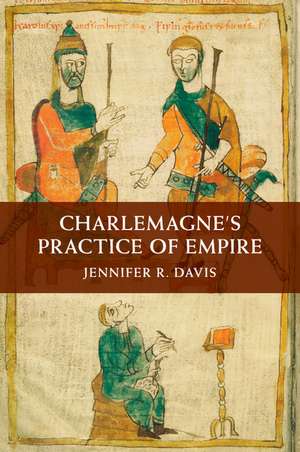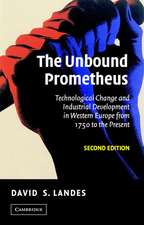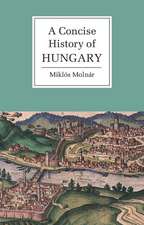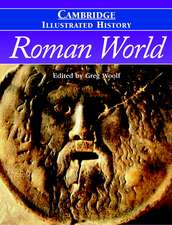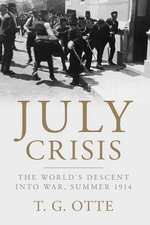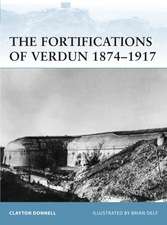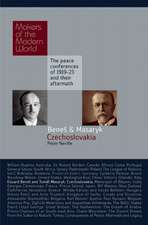Charlemagne's Practice of Empire
Autor Jennifer R. Davisen Limba Engleză Paperback – 31 mai 2017
| Toate formatele și edițiile | Preț | Express |
|---|---|---|
| Paperback (1) | 281.79 lei 43-57 zile | |
| Cambridge University Press – 31 mai 2017 | 281.79 lei 43-57 zile | |
| Hardback (1) | 945.06 lei 43-57 zile | |
| Cambridge University Press – 19 aug 2015 | 945.06 lei 43-57 zile |
Preț: 281.79 lei
Nou
Puncte Express: 423
Preț estimativ în valută:
53.92€ • 56.45$ • 44.62£
53.92€ • 56.45$ • 44.62£
Carte tipărită la comandă
Livrare economică 07-21 aprilie
Preluare comenzi: 021 569.72.76
Specificații
ISBN-13: 9781107434134
ISBN-10: 1107434130
Pagini: 551
Ilustrații: 3 b/w illus. 2 maps 5 tables
Dimensiuni: 152 x 230 x 28 mm
Greutate: 0.73 kg
Editura: Cambridge University Press
Colecția Cambridge University Press
Locul publicării:New York, United States
ISBN-10: 1107434130
Pagini: 551
Ilustrații: 3 b/w illus. 2 maps 5 tables
Dimensiuni: 152 x 230 x 28 mm
Greutate: 0.73 kg
Editura: Cambridge University Press
Colecția Cambridge University Press
Locul publicării:New York, United States
Cuprins
Introduction; Part I. Strategic Rulership: Introduction: tools of control and coercion; 1. Managing royal agents; 2. Disciplining royal agents; 3. Fractured control: Charlemagne's response to dissent; Conclusion: control and its limits; Part II. Center and Region in Charlemagne's Empire: Introduction: unity and diversity in Charlemagne's empire; 4. An empire of regions?; 5. The conquered regions as arenas for experimentation; 6. The nature of the empire: centralization and communication; Conclusion: the imperial character of Charlemagne's realm; Part III. An Empire of Practice: Introduction: continuity, change, and the building of an empire; 7. The chronology of the reign; 8. Recta via: the dynamics of political change; Conclusion: an empire of practice; Conclusion: Charlemagne's invention of medieval rulership; Bibliography; Index.
Recenzii
'Historians have rightly emphasized the importance of religion to Charlemagne and his contemporaries. In this refreshingly original, lucid and strongly argued book, Jennifer R. Davis shows that ideology is only part of the story. Finding what worked empirically was what drove Charlemagne's practice of empire, and produced some enduring effects.' Janet Nelson, King's College London
'Jennifer R. Davis' study fundamentally revises older romantic images of Charlemagne's empire as a short period of a Renaissance of central authority and imperial unity. Exploring its formation as the result of an experimental process that was much more shaped by practical reason than by ideology, by pragmatic flexibility, and by fuzzy conceptions than by the implementation of an imperial master plan, Davis provides us with a fresh look at the formation of a new imperial culture, which shaped European politics for many centuries to come.' Helmut Reimitz, Princeton University, New Jersey
'Davis has written not yet another Charlemagne biography, but rather an audacious reassessment of his reign as a crucial episode in the history of European rulership and governance. Deeply learned, meticulously researched, and subtly argued, it is a model for how to write pre-modern political and institutional history in the twenty-first century.' Adam J. Kosto, Columbia University, New York
'With this prodigious study, Jennifer R. Davis has announced herself as an important scholar of Carolingian politics.' Hans Hummer, German History
'This book has already established itself as essential reading for specialists of the period and for all historians concerned with the question of empire and pre-modern states. It manages to combine the study of institutions of government with that of networks of power, too often seen as contradictory. It suggests approaching the great sovereigns in terms of their concrete actions, leaving aside for the moment how they were represented. The results are convincing and even astonishing, because even if the author did not set out to write a biography, by the end of the book, the reader is left with an original impression of the personality of Charlemagne.' Martin Gravel, Revue historique
'In some ways this is a radical book … But while the arguments are bold, the underlying scholarship is sound and thorough … [Jennifer R. Davis] has written an important book brimming with new ideas and suggestions for further research.' C. M. A. West, The English Historical Review
'This book has much to offer scholars of the early Middle Ages. Davis gleans as much from of the sources as possible, but rather than force the evidence into a particular vision or framework of empire, she's able to elucidate both the specific political practices and broader outlines of Charlemagne's rulership. Additionally, she is able to address the extensive body of scholarship on Charlemagne's reign, balancing older, still relevant works, such as that of the eminent François-Louis Ganshof, with more recent studies of Charlemagne's reign. This is an important contribution to the still-growing body of work on early medieval politics and Carolingian kingship.' Jace Stuckey, Speculum
'Jennifer Davis's new book combines the traditional and the new in intriguing and productive ways … an important and distinctive view of Charlemagne and his rule … Davis's study encourages us all to think substantially harder about what exactly Charlemagne was trying to do, the methods he used and both his successes and failures.' Rachel Stone, Early Medieval Europe
'Charlemagne's Practice of Empire is a challenging read - the type that forces the reader to immediately think about how to react to it. It is as provocative as it is profound, and which will hopefully become a standard work of reference for the years to come, inspiring students and more advanced scholars alike.' Rutger Kramer, Sehepunkte
'This is material with which Davis is intimately familiar, and her command of the subtleties of these texts and their manuscript traditions comes through clearly throughout the volume … Whether one accepts some or all of Davis' conclusions, her study is now essential reading for all specialists working on early medieval Europe. Essential.' David S. Bachrach, H-France Review
'Jennifer R. Davis' study fundamentally revises older romantic images of Charlemagne's empire as a short period of a Renaissance of central authority and imperial unity. Exploring its formation as the result of an experimental process that was much more shaped by practical reason than by ideology, by pragmatic flexibility, and by fuzzy conceptions than by the implementation of an imperial master plan, Davis provides us with a fresh look at the formation of a new imperial culture, which shaped European politics for many centuries to come.' Helmut Reimitz, Princeton University, New Jersey
'Davis has written not yet another Charlemagne biography, but rather an audacious reassessment of his reign as a crucial episode in the history of European rulership and governance. Deeply learned, meticulously researched, and subtly argued, it is a model for how to write pre-modern political and institutional history in the twenty-first century.' Adam J. Kosto, Columbia University, New York
'With this prodigious study, Jennifer R. Davis has announced herself as an important scholar of Carolingian politics.' Hans Hummer, German History
'This book has already established itself as essential reading for specialists of the period and for all historians concerned with the question of empire and pre-modern states. It manages to combine the study of institutions of government with that of networks of power, too often seen as contradictory. It suggests approaching the great sovereigns in terms of their concrete actions, leaving aside for the moment how they were represented. The results are convincing and even astonishing, because even if the author did not set out to write a biography, by the end of the book, the reader is left with an original impression of the personality of Charlemagne.' Martin Gravel, Revue historique
'In some ways this is a radical book … But while the arguments are bold, the underlying scholarship is sound and thorough … [Jennifer R. Davis] has written an important book brimming with new ideas and suggestions for further research.' C. M. A. West, The English Historical Review
'This book has much to offer scholars of the early Middle Ages. Davis gleans as much from of the sources as possible, but rather than force the evidence into a particular vision or framework of empire, she's able to elucidate both the specific political practices and broader outlines of Charlemagne's rulership. Additionally, she is able to address the extensive body of scholarship on Charlemagne's reign, balancing older, still relevant works, such as that of the eminent François-Louis Ganshof, with more recent studies of Charlemagne's reign. This is an important contribution to the still-growing body of work on early medieval politics and Carolingian kingship.' Jace Stuckey, Speculum
'Jennifer Davis's new book combines the traditional and the new in intriguing and productive ways … an important and distinctive view of Charlemagne and his rule … Davis's study encourages us all to think substantially harder about what exactly Charlemagne was trying to do, the methods he used and both his successes and failures.' Rachel Stone, Early Medieval Europe
'Charlemagne's Practice of Empire is a challenging read - the type that forces the reader to immediately think about how to react to it. It is as provocative as it is profound, and which will hopefully become a standard work of reference for the years to come, inspiring students and more advanced scholars alike.' Rutger Kramer, Sehepunkte
'This is material with which Davis is intimately familiar, and her command of the subtleties of these texts and their manuscript traditions comes through clearly throughout the volume … Whether one accepts some or all of Davis' conclusions, her study is now essential reading for all specialists working on early medieval Europe. Essential.' David S. Bachrach, H-France Review
Notă biografică
Descriere
A new interpretation of Charlemagne, examining how the Frankish king and his men learned to govern the first European empire.
